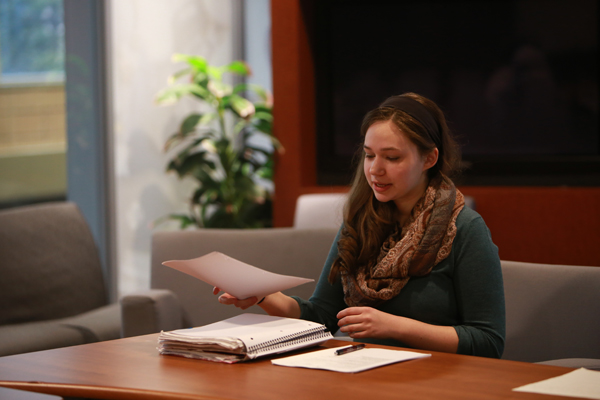Women's Autobiographies Writing Group Fosters Reflection and Dialogue

Lisa Toro started her memoirs about 15 years ago, while working as a research scientist in California.
She was also working with foster youth and wanted to share her life story, including being raised in foster care and being homeless at times.
"I started the book as a means to inspire some kids," said Toro, who has a Ph.D. in neurobiology and behavior.
She made strong progress the first two years, but then her memoir writing stagnated as she held various university teaching jobs in California, the Caribbean, and the South Pacific.
"I would start and stop. Sometimes you need that supportive community, which reminds you what you care about."
Toro found that community when she joined the University of Michigan-Flint last fall. She starting attending the new Women's Autobiographies Writing Group, formed by the Women's Educational Center director Rushika Patel.
The group, which meets every Thursday from 11:00 a.m. to noon, spurred Toro along. The conversations and people she met sparked new passages in her book. It even helped her figure out an ending. Toro, a lecturer III in psychology, hasn't been to the group yet this semester but the sessions helped get her back into a zone, and now she works on the book every day.
"There was this interface between different generations and different levels of experience," Toro said about last semester's writing group. "There were all kinds of different writing."
Patel started the weekly sessions in the Alvin D. Loving Lounge in the University Center last June. The ever-evolving group of participants include staff, students, faculty members, and people from the community. It originated as a women's writing club, but men have joined and are welcome.

The range of writing varies widely. At recent sessions, the work included a short story about twins, a personal essay on acting differently with different people, and musings about family. Many people aren't writing memoirs but are reflecting on their life in some way.
"Even the act of writing, it creates a commitment to deal with things that are perhaps unresolved," Patel said. "It is almost writing as catharsis, but more so as writing as empowerment."
Because of people's schedules, the dynamics and mix of participants changes weekly and by semester. Some people read their writing out loud and break it down with the other group, while others keep it private, Patel said. The group isn't a strict writing group, in which people have to compare their styles or work.
Patel said, "Once they come, they realize this is pretty informal and 'I can just come as I am.'"
The group typically spends half an hour writing and half an hour talking about their writings and any themes that arise. The day's facilitator provides optional writing prompts.
Elena Sobrino, a senior double-majoring in music and anthropology, said the sessions are "a place that people can feel very safe talking about personal things."
Sobrino often finds the prompts spark a communal conversation, which in turn, can inspire her own writing or thinking later on.
"I think of the writing part as the springboard to the discussion. It is not about polishing your writing or working on your technique as much, although it could be," she said. "To me, I think that is the best part, hearing what everybody wrote and how it leads to something more."
Contact University Relations staff writer Robert Gold with comments, questions, and ideas at goldr@umflint.edu, (810) 424-5596, or on Twitter, @writerobert.
Related Posts
No related photos.
UM-Flint News
The Office of Marketing & Communications can be reached at mac-flint@umich.edu.